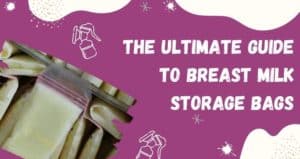-
Author: Khushboo Kirale
- >> Post Created: October 7, 2020
- >> Last Updated: May 6, 2024

Reasons to stop breastfeeding - Table of Contents
UNICEF and WHO have forever recommended exclusive breastfeeding till about 6 months post-delivery. Unfortunately, despite recommendations, many mothers are unable to breastfeed, don’t breastfeed at all, or even stop early. Generally, their reason to stop breastfeeding range between physiological, psychological, medical, and social reasons.
A recent study in 2018, looked at different aspects which impacted breastfeeding mothers to stop breastfeeding before six months post-delivery.
Through studies and research, scientists and breastfeeding experts have narrowed down some of the most common reasons for moms to stop nursing. We are listing a few of these key factors in this article on ‘reasons to stop breastfeeding.
Reasons to stop breastfeeding—Mothers
All women are generally aware about the benefits of breastfeeding, then why do they stop breastfeeding? As per a study done by CDC, around 80% of moms in the US commence breastfeeding postpartum, but only about a third of them continue nursing till their babies turn 1.
There could be a number of scenarios where one may have to cease to breastfeed. Some of the reasons to stop breastfeeding are listed here for your reference.
Related Posts:
Physiological
Giving birth by C-section
There can be some challenges initially in breastfeeding due to C-section like delay in let-down; however, it’s just a temporary phase. Speak to your doctor in advance and don’t panic if your let-down is delayed.
Reasons of Low Breastmilk supply – Easily be resolved
Generally a mother comes to know if she is producing enough milk for the baby or not.
If you feel due to any reason that you are not producing enough milk, speak to your doctor first or a lactation consultant, before you decide to wean your baby.
There could be other reasons for insufficient milk production, like stress, fatigue, improper sleeping patterns, etc. to name a few.
Most reasons for low breast milk production can be easily treated through medication, balanced diet, and a lot of rest.
Sometimes low-milk production could be related with improper latching. Hence, always ensure your baby is correctly latched on to the areola or the dark part of your breast/nipple. Ensure that your baby is positioned right and is comfortable in the position.
- Reasons for Low-breast milk supply – Cannot be resolved easily
There are some problems that can cause low-breast milk supply, which cannot be easily resolved, like:
o Insufficient glandular tissue (hypoplastic breasts)
o Polycystic ovary syndrome (PCOS)
o Hypothyroidism
o Previous breast surgery, such as mastectomy or a breast reduction surgery
o Prior radiation treatment for breast cancer.
If you truly have a low-milk supply, then exclusively feeding your baby on breast milk might not be possible. Your child will probably have to take infant formula or donor breast milk to fulfill the majority of his nutrition needs.
Breastfeeding provides a lot more than just nutrition, so in spite of low-milk production do try and give your baby breast milk in whatever small amount as possible. Many infants and even older children breastfeed for comfort and security.
Mother’s health
There are times when mother is not in a position to breastfeed. It could be due to health, complications, fatigue, or even due to certain medications.
In such cases the baby has to be weaned early.
In such a scenario, your pediatrician will help you in planning your baby’s diet chart.
Read this next
Physical discomfort
Related to breasts
Breastfeeding isn’t supposed to hurt, but sometimes it does. Here are five common causes of breastfeeding pain—and what you can do to resolve the pain.
Improper latch:
This can happen especially if the baby has not taken in the entire nipple and areola in their mouth. So do ensure that your baby has latched on properly on your breast every time you breastfeed. You could also use a feeding pillow and adjust it well so that your baby is high enough to easily latch on your breasts.
You could also look at repositioning your baby. Both of this could help you lessen the sting.
Cracked nipples
: Incorrect latching could also bring about chapped or cracked nipples. You need to give your breast some rest in such scenarios. Remember to express milk whenever you feel your breasts are full, because not emptying your breasts could lead to different complications. You could also look at using soothing ointments to help your breast heal faster.
Thrush
It’s a common fungal infection which affects both mother and child. You could notice red patches on your breasts or fire red nipples, along with shooting pains in the breasts if you are suffering with thrush. Your doctor may prescribe an antifungal cream to start with. But if sharp pain persists while breastfeeding, your doctor may prescribe a stronger prescription in order to cure thrush. Be sure to regularly wash your nursing bras in hot water. It’ll help kill the fungus.
Clogged duct
Sometimes you may experience pain and tenderness under areola which could be caused due to clogged milk. In such scenarios please do not stop breastfeeding or expressing. Getting the milk out is the only way you can actually relieve your pain. Have warm baths and massage the area gently before you express. Even use of cold cabbage leaves on breasts can be soothing (leave the cabbage on until it wilts).
Mastitis
When the breast tissue is inflamed and infected, it can cause some pain while breastfeeding, redness in the affected areas, and possible fever and chills. Skipped breastfeeding sessions and engorgementcan also contribute to mastitis. If you’ve got a heavy milk flow, keep a hand pump close by to relieve the pressure throughout the night, even when the baby is not awake and ready to feed. Antibiotics are likely needed to reverse mastitis.
Meeting increased nutritional requirements
Over a period of time, you may be unable to meet your baby’s nutritional requirements only through breast milk. They need to be introduced to other solid foods to meet dietary requirements.
You need to ensure you maintain the nutritional requirements your baby, to safeguard their immune system. Over a period, your breast milk production will eventually go down, so look at healthy nutritional alternatives for your baby so that his immunity is not affected.
Fatigued
As a new mother, you are anyways dealing with a lot of changes happening within your body especially all the hormones trying to come back to normal.
Apart from the physical changes, you are adjusting to your baby’s erratic patterns, breastfeeding, and also managing your home and other kids (if any). This all drains a lot of energy from you. If you are not resting enough and not following a healthy diet, this will affect your breastfeeding, resulting in early weaning of your baby.
Baby bites
Baby bites typically happen when your baby is teething. Around this time they are more interested in chewing than sucking. This could lead to cuts and bruises and even sore nipples.
In certain extreme cases this could lead to infection which is very painful, cause of which you may have to wean your baby earlier.
Psychological
Moms unwilling to give up their coffee and alcohol
It’s generally safe to express or breastfeed before drinking alcohol or consuming caffeine. You can breastfeed 3–4 hours after consuming small amounts of alcohol or caffeine. Small amounts are out of your system in a few hours and will not affect your breast milk.
Breastfeeding mothers can very safely enjoy one alcoholic or caffeinated beverage each day in between breastfeeds. Just keep yourself well-hydrated.
Mothers that are especially concerned can use the commercially available breast-milk testing strips that can determine if there is alcohol in your breast milk. These can be purchased online and are also available at certain pharmacies.

Breastfeeding affects female sexual function.
Yes, breastfeeding does affect female sexual functions. They experience vaginal dryness. Sometimes women also experience a dip in their libido.
Some partners can deal with little or no sex while one is breastfeeding, but its kind of difficult for a lot of couples to keep it together with all the changes and adjusting and all.
Sometimes due to these added pressures, mothers decide to wean their baby early.
Constant worry of milk production not being sufficient for the baby.
Most of the mothers have this constant worry—whether they are actually producing enough breast milk for their baby. With the slightest change they notice in the feeding patterns, they are on edge. This psychologically affects breastmilk production – The constant worry.
But, honestly, it’s okay, because no mother knows if their milk production is actually enough.
You can judge if your baby is getting enough milk by how frequently they are urinating. However, it’s tricky because when a baby wears diapers, it’s difficult for you to keep a tab of the frequency of urination.
If you have a habit of expressing milk 2–3 times a day you will be in a position to measure and estimate how much you are feeding your baby.
Some women manage this situation well, but there are a few who are more worry some they tend to supplement breast milk slowly with formula and gradually they wean their baby cause of the constant worry.
For the worry some lot, speak to your doctor or a lactation consultant before you decide to stop breastfeeding.
Breastfeeding is time-consuming process—paying due attention to the elder kid becomes a problem.
Definitely breastfeeding is a time consuming. Especially for the first few weeks. You are adjusting to the baby and visa versa and also adjusting with the changes in your own body. All this can become too overwhelming for a few women while the hormones are still settling out.
In this all breastfeeding can become taxing, wanting mothers to move to formula milk earlier on for their comfort.
Sometimes you would feel guilty for not giving time to your elder one and with switching to formula you can give your elder one the time they need, leading to early weaning.
If you feel you are unable to dedicate time for your elder ones, involve them while you are nursing and taking care of the newborn.
Create games that you can enjoy with your elder one even while you are breastfeeding.
Medical
Dependency on illegal/ unprescribed drugs
You need to be very careful with the medications you take during and after your pregnancy.
So, self-administration of illegal drugs is not advisable and will not go well with your pregnancy, breastfeeding, or even parenting.
Other than being illegal, street drugs are hazardous for a mother and her child. As you are aware anything you eat and drink—even medications get passed on to your baby through breastfeeding.
If your baby happens to get these illegal drugs through breast milk then you can see them getting more irritable and sleepy and may have a slower growth rate as well, and on a more serious note, it could lead to permanent neurological damage and maybe even death.

Compatible medication
Many of the medications do not affect you or your baby while breastfeeding, but some affect breastfeeding adversely and are known to reduce milk supply. Few prescription drugs are harmful for the baby as well.
Some of the medications that are not compatible with breastfeeding are chemotherapy drugs, antiretroviral medications, radioactive iodine, some sedatives, seizure medication, and medicines that may cause drowsiness and suppress breathing.
Always talk to your doctor, before starting any new medication especially when you are breastfeeding. Your doctor will prescribe you medications that are safe while breastfeeding.
Infant Jaundice
Infant jaundice causes many healthcare professionals to suggest formula supplementation in the first week of life.
It is true that breastfed infants are more prone to get jaundice than formula-fed infants.
Jaundice develops because of immature newborn liver. Some theories show that jaundice may be beneficial to infants. But a severe jaundice is a serious medical condition and one of the methods suggested for treating it is by switching the baby to formula milk for a few days.
This is because this treatment is easier as compared to other forms of therapy such as phototherapy.
Many pediatricians feel formula feeding is usually not the best first-line treatment, as many women just stop breastfeeding all-together after they are advised by a health care professional to switch to formula for a few days due to jaundice.
Infectious disease
Most infections can be easily treated and do not get passed on to the baby via breast milk. However, few infectious diseases can pass to a baby through breast milk and the risk of transmission outweighs the benefits of breastfeeding. These conditions include:
- HIV:The human immunodeficiency virus (HIV) is the virus that causes acquired immunodeficiency syndrome (AIDS). A mother suffering from HIV can pass it to her child through breast milk. As AIDS currently has no cure, a mother who is HIV positive should refrain from breastfeeding if there is a safe alternative available. However, when a safe replacement is unavailable, exclusive breastfeeding may be recommended.
- HTLV:The human T-cell lymphotropic virus 1 (HTLV-1) is a virus that can lead to leukemia and lymphoma. Human T-cell lymphotropic virus 2 (HTLV-2) can cause brain and lung issues. These viruses may not cause any symptoms at all, but they are lifelong conditions with no cure. As HTLV-1 and HTLV-2 can be passed from a mother to a baby through breastfeeding, breast milk should not be given to the baby. However, studies show that HTLV-1 cells can be destroyed by the freezing and thawing of expressed breast milk if the milk is frozen at a temperature of ˗4 degrees F (˗20°C) or below for more than 12 hours.
- Active tuberculosis infection: Tuberculosis (TB) is a bacterial infection in the lungs. It is passed through respiratory droplets, not by breastfeeding or breast milk. However, a mother (or any other caregiver) can give active tuberculosis to a child through coughing, sneezing, and touching. If a mom has active TB, but the baby does not, then the mom should not be in close contact with her child and should not even breastfeed. But, as TB is not transmitted through breast milk, the baby can feed on pumped breast milk. Breastfeeding can begin only after about two weeks of treatment for the disease. If both mother and child have TB, they can remain together for the duration of the treatment, and the mother can also breastfeed the baby.
- Herpes on the breast:Herpes cannot be passed through breast milk, but if there are lesions on the breast or on any other part of the body that is not covered, it can affect the baby. The herpes virus can be deadly to a baby. But hand washing and covering the affected area can make you ready to breastfeed your baby.
Special note for the Covid 19 times… – Can COVID-19 be transmitted through breast milk?: At present, data is not sufficient to conclude vertical transmission of COVID-19 through breastfeeding. In infants, the risk of COVID-19 infection is low, the infection is typically mild or asymptomatic, while the consequences of not breastfeeding and separation between mother and child can be significant. At this point it appears that COVID-19 in infants and children represents a much lower threat to survival and health than other infections that breastfeeding is protective against
Hormonal birth control can reduce breast milk production
Breastfeeding itself is considered a slightly effective form of birth control but it is not a definitive one.
Oral contraceptives are known to reduce breast milk production.
Many OB-GYNs do not discuss this risk while prescribing oral contraceptives to breastfeeding mothers. This leads to a lot of heart ache for the mother.
If women who already do not have adequate milk production take oral contraception will need to sustain their baby with formula.
There are contraceptives available in the market that do not affect breastfeeding. Speak to your doctor about the same.
Antidepressants and other prescription drugs lead many women to avoid breastfeeding
Most physicians are unable to look up information on prescription drug compatibility with breastfeeding. Sadly, many women stop breastfeeding after anesthesia for surgery or because they had to take an antibiotic. Breastfeeding while on antidepressant drugs known as SSRIs is especially controversial right now. There is no true medical consensus regarding the safety of SSRIs in breastfeeding.
Social
Discomfort with nursing in public.
We are a bottle culture, one that sexualizes breasts. Though breastfeeding is just feeding a baby, a lot women still feel or are made to feel uncomfortable when they try and breastfeed in public.
Honestly, it’s completely ok to breastfeed in public. The more confident and determined you make yourself as a mother, the less important other people’s opinion would be.
Recommencing work
As a working mom, you may have to resume work once your maternity leave is over. This is one of the major reasons in today’s day and age because of which the baby has to get weaned early.
Furthermore, breast pumping at work is time-consuming. Many times, women end up locking themselves somewhere during their lunch hour. The expressed milk has to be stored well in a refrigerator. This is not always possible, as the fridge in office is generally a public one.

These challenges can become a hindrance in breastfeeding while you are at work.
However, nowadays most organizations have a crèche service available, which works very well for working moms like us.
Plan in advance after discussing in details with your HR about maternity benefits you could avail. You may be surprised to know that some corporates give 2 years paid maternity leave.
Planning ahead will help you introduce alternative foods to your baby, and the change can be gradual.
As per one of the reports released by the Australian Infant Feeding Survey, it was observed that mothers who return to work before their baby is 6 months old are less likely to breastfeed their baby at six months than mothers who are not employed.
Lack of adequate understanding
Many times mothers may not be clear of the risks of formula feeding sometimes due to breastfeeding not being a cultural norm as seen in many strata’s of the society.
This lack of information during the early days of pregnancy, when it’s really taxing on the mother due to the changes happening within her body and trying to meet the demands of taking care and providing for the baby, makes mothers more vulnerable and they prefer the easy way out with the help of formula.
With right support and guidance the above can easily be averted.
Lack of right support
It is crucial that a would-be mother and a new mother be rightly informed about the role of breastfeeding and they get a lactation consultant’s guidance earlier on. It makes a lot of difference to the psychology of the mother.
A lack of such support at the right time, can actually be a big put off for a lot of mothers and these mothers tend to wean their babies much earlier than otherwise.
In absence of proper guidance, a baby could be introduced to bottle formula feed within 24–48 hours postpartum, as both baby and mom are adjusting as lactation/let-down only happens after 24—72 hours of delivery.
Baby’s latch on to rubber nipples quite easily and gulp down the feed faster, which can sometimes make the mother think if she is able to suffice her child well.
Reasons to stop breastfeeding—Babies
When a baby can’t breastfeed
Most babies can breastfeed. Even infants born with birth issues such as prematurity, cleft lip and palate, or Down syndrome may not be able to take the breast right away, but can still take pumped breast milk in a bottle. With patience, time, and help, these babies may go on to breastfeed successfully.
Only when the baby is born with some genetic condition that affects their metabolic process, breastfeeding might not be possible. Even with such a condition, sometimes the baby can still breastfeed partially. These conditions include:
No interest in breast milk
In some cases, it has been observed that as soon as you introduce alternative feeds—could be solids or even formula milk—the baby likes the taste of the alternatives more than breast milk. In these cases, the baby loses interest in breast milk and will soon self-wean.
I will always suggest you to consult your pediatrician before you plan any changes to your baby’s feeding.

Malcontent baby
When your milk supply does not suffice your baby during a feed, it makes them irritable. They express their anger by not latching, biting, and so on. Overall, they do not know what to do when they are not content with the milk supply, which is why they will become overly irritable and cranky.
Speak to your doctor in case you need to introduce formula milk to suffice your baby’s requirements. You can also look at expressing your breasts whenever they feel full. And when your baby needs you could breastfeed with a nursing supplementer device. These devices are really useful when you are feeling fatigued and stressed and do not want your baby to lose the practice of latching onto you and side-by-side you can continue breastfeeding as well.
Classic galactosemia
Galactosemia is the body’s inability to break down galactose. Galactose is one of the components of milk sugar lactose, and lactose is the main sugar in breast milk. So, if a baby tests positive for classic galactosemia, they will not be able to breastfeed or take breast milk in a bottle without any side effects. The child will need a special infant formula and a galactose-free diet as they grow to prevent severe complications such as jaundice, vomiting, diarrhea, long-term developmental problems, and death.
A less severe form of galactosemia is called Duarte’s galactosemia. Children with Duarte’s galactosemia can break down some galactose. Under the direct care of a doctor specializing in metabolic disorders, it may be possible to breastfeed while supplementing with the galactose-free formula. Frequent evaluation of the galactose levels of the baby will help keep the condition under control and the baby healthy.
Phenylketonuria (PKU)
A baby with PKU can’t break down phenylalanine, an amino acid naturally present in breast milk. Higher levels of phenylalanine in the body can cause brain damage. Therefore, babies with PKU should not be given food containing phenylalanine. You can feed a special formula which is designed specifically for children with PKU. As the presence of phenylalanine in the breast milk is low, a combination of breastfeeding and special phenylalanine-free formula feeding can be given to a baby with PKU. If you have taken the decision to breastfeed your baby suffering from PKU, ensure that you control the breastfeeding amount and also conduct regular blood tests to monitor your baby’s condition and avoid any mishaps.
Maple syrup urine disease
A baby born with maple syrup urine disease cannot break down the amino acids leucine, isoleucine, and valine. If these amino acids accumulate in the baby’s blood, a sweet maple syrup kind of scent is given off from them which is dominant in the urine, ear wax, and sweat. The build-up of these amino acids can cause sleepiness, poor feeding, vomiting, seizures, coma, and death. To ensure your baby gets the required nutrition, your doctor will recommend a special formula that doesn’t contain the 3 amino acids. The doctor may further recommend partial breastfeeding, where you control the amount of breast milk given to the child so that you can minimize the effect of amino acids.
Things to remember
- It is completely up to you and your baby to decide when and how to stop breastfeeding.
- Try and breastfeed for the first six months, then you can gradually introduce age appropriate alternative foods in the next six months along with breast milk.
- Feeding breast milk even for a short duration is beneficial.
Takeaway
When to stop breastfeeding is a very personal decision that you need to make with a lot of consideration, and it also needs to be something that you and your baby is ready for.
Unfortunately, you may feel pressure from outside sources—your friends, family, doctor, or even your partner—to make a particular decision that doesn’t quite feel right to you. Do your best to trust your instincts here. Usually your “mother’s instinct” knows what’s best for you and your child.
Ultimately, whatever decision you make, you and your child will be fine. Whether you breastfeed for 1 month, 1 year, or even more, you can be assured that each drop of milk you fed your child did a world of good—and that you’re a wonderful parent.
What are your thoughts? Why did you decide to stop breastfeeding, or, not to breastfeed at all? What can we do to address these issues? Please, post your thoughts and ideas in the comment section below. Together, let’s make breastfeeding easier for all women and babies.






